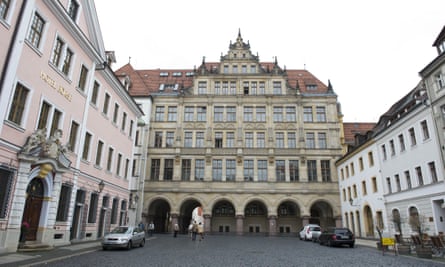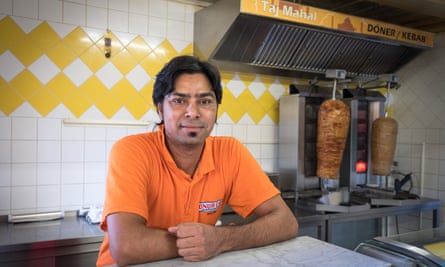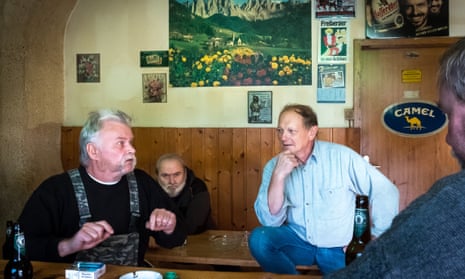Two days after a historic vote saw an overtly nationalist party enter the German parliament for the first time in more than five decades, a group of over-60s vent their grievances over lunchtime beers and cigarettes in the smoky back room of a dry petrol station on the border between the German state of Saxony and the Czech Republic.
The German government is throwing cash at refugees “while native pensioners can’t afford to buy a new pair of glasses”, they complain. Putin is Europe’s “only guarantor of peace”, they argue, and Germany is still “under occupation” by America.
A retired lorry driver with a handlebar moustache cites a joke he read in the tabloid Bild, which says that in the wake of Sunday’s federal elections, Angela Merkel should consider handing Saxony to the Czechs in exchange for some of their toxic waste. “Let’s have it,” he shouts. “We’ll become Sudeten Germans again.”
Oppach lies in the new heartland of Germany’s far-right upstarts, part of a cluster of five villages in the district of Görlitz where Alternative für Deutschland won more than 44% of the vote on Sunday.
With 12.6% of the national vote, the AfD will be the third-strongest force in the next Bundestag, but in Saxony the party is already top: 27% of voters cast their ballot for the party that wants to hold a referendum on leaving the eurozone, ban burqas and minarets, and have Merkel prosecuted for her decision to open Germany’s borders to refugees in 2015.
AfD candidate Tino Chrupalla, a painter-decorator who won one of his party’s three direct mandates in Oppach’s local constituency, unseated the regional secretary of Merkel’s Christian Democratic Union, an MP with 15 years’ experience. Daily newspaper Taz described Sunday’s result as “the revenge of the East”, a slogan that resonated with pensioners of Oppach, many of whom said they had switched to the AfD because they felt let down by the traditional parties.
Peter Hampel, the petrol-station owner, used to do a roaring trade when Saxony was still part of the former East Germany. But when walls started to crumble, things took a turn for the worse.
As the border opened to the west, in came large petrol-station chains offering competitive prices. When the EU expanded eastwards in 2004, drivers simply filled up their tanks down the road in the Czech Republic, where a litre of petrol is 20 cents cheaper.
Eventually Hampel had to file for insolvency, but a pension of €400 a month was not enough to pay off his debts. He now sells newspapers, tobacco and alcohol instead of petrol.
“I lost all trust in the government,” said the 66-year-old, who describes himself as a “working pensioner”. “They promised us it would take 20 years to adjust wages and pensions, and look where we are now.”
But not everyone in the village agrees that AfD voters have legitimate economic concerns. “No one around here is really poor as such,” said Jenny Sachser, one of two young mothers pushing a pram down the road just a few metres from the petrol station. “Some people here simply can’t get off their arses, and they end up blaming everyone but themselves for it.”
Sachser and her friend Susanne Starke, both in their early 30s, were born in Oppach but left to study and work elsewhere: decisions that follow a broader demographic trend. Between 1989 and 2001, 1.2 million people emigrated from east Germany to west Germany; the largest group were young women between 20 and 35.
“If you go to a nightclub here, it’s four men to every woman,” said Starke, who recently moved back to the area. A 2007 study cited higher male-to-female ratios in parts of the former East than in the Finnish Arctic circle, suggesting that East German men, 26% of whom voted AfD, have above all been left behind in a demographic sense.
Far from struggling, Saxony’s GDP grew last year by 2.7%, faster than any other German state. The AfD also came second in parts of Bavaria and Baden-Württemberg, the country’s economic powerhouses.
A short drive outside Oppach also belies one common complaint voiced inside Hampel’s makeshift beerhall that roads here are “worse than they are in Romania”. Streets and facades in the surrounding villages are tidy, kerbs lined with shining Audis and BMWs. At a logistics factory in Oppach, the owner said the only struggle was to find new staff.
The nearby city of Görlitz, where the AfD also came out top, has been preened with the help of federal funds and private donations: its majestic baroque and renaissance exteriors were used as the backdrop to Wes Anderson’s film The Grand Budapest Hotel. Yet some locals feel Görlitz’s wealth is just that, an expensive facade.

“They’ve built all these pretty offices,” said shaven-headed fortysomething Heiko, drinking a beer outside a kiosk on Lutherplatz square and pointing at the renovated facades around him, “and yet you still have people sleeping on the street”. He would not say which party had got his vote, though he suggested that he found some of the AfD’s rhetoric “went too far”.
Adjusting state pensions between east and west Germany has been a priority project for the outgoing labour minister, Andrea Nahles, and some economists argue that they now tilt unfairly in favour of pensioners in what was once the GDR. But as with many things, many of those living in the former East Germany feel that statistics don’t tell the full story.
Merkel’s handling of the refugee crisis usually comes top of the reasons why voters in Saxony rooted for the AfD, even though the number of people with multicultural backgrounds living in the state is lower than elsewhere. But they are afraid of radical Islam and the terror attacks they have read about in the news and on “alternative media”, in spite of the poor broadband coverage in the area.
“We voted AfD so we don’t get any refugees in the first place,” explained one person inside Hampel’s beerhall. “Once you’ve got weeds, they are hard to get rid of. So you make sure they don’t grow to start with.”
While the GDR had loan worker schemes similar to those in the west, they were limited to socialist “brother states” and mainly involved migrants from non-Muslim backgrounds such as Vietnam, Cuba or Mozambique.

In Oppach, even the local kebab shop is called Taj Mahal. Gargaria Paramjit Singh, 37, who works there, came to Europe from India as an economic migrant in 1998, and ended up in a local asylum seekers’ centre even though he had tried to get to Italy.
Having spent years living under threat of deportation, Singh is now married to a local and says he, too, would be critical of refugee shelters being built next to their children’s school. “Germans hate it when people don’t behave,” he said. “But if you stick to the rules, they respect you.”
Once he got to vote in Germany, he said, he might even consider voting for the AfD, though he hoped they would “not tar all people with the same brush”.
